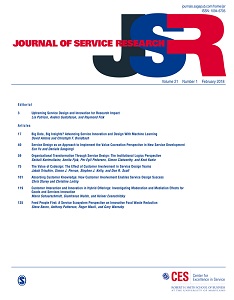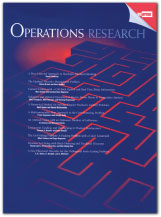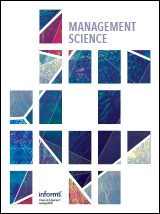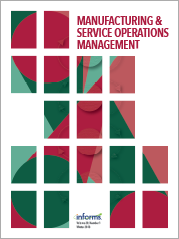Academic articles
Practitioner articles
Working papers
Books
Book chapters
Case studies
Other publications
Subject(s)
Marketing
Keyword(s)
price negotiation, power, dependency, buyer–seller relationship, demand contraction
Extant literature has studied how customer–salesperson price negotiations evolve in “normal” circumstances. However, recent economic recessions illustrate the need to advance theory on the question of how price negotiations evolve in “abnormal” times when customer demand significantly contracts beyond expected variation. In response to this gap in the literature, this study uses a multi-method design to investigate price negotiations during exceptional demand contractions. Our results from a theories-in-use study reveal that during such circumstances, salespeople’s perceived dependency on customers increases while customers’ perceived dependency on salespeople decreases. The inherent “power shift” should benefit customers in subsequent price negotiations. However, customers are less likely to capitalize on their power if they have a close relationship with a salesperson, implying that salespeople do not have to concede on price negotiations. This effect is likely due to increased sympathy during periods of exceptional demand contractions. The authors further validate key propositions from this qualitative study in a field study and a scenario-based experiment. Altogether, this study suggests that managers should not be too hasty in approving and encouraging salespeople to offer unnecessary price discounts during exceptional demand contractions as buyers may become more sympathetic and lenient during price negotiations.
With permission of SAGE Publishing
Volume
26
Journal Pages
351–370
Subject(s)
Management sciences, decision sciences and quantitative methods
Keyword(s)
congestion, diagnostic accuracy, experiments, partially observable markov decision process, path-dependent decision making, undertesting, task completion bias
To study the effect of congestion on the fundamental trade-off between diagnostic accuracy and speed, we empirically test the predictions of a formal sequential testing model in a setting where the gathering of additional information can improve diagnostic accuracy, but may also take time and increase congestion as a result. The efficient management of such systems requires a careful balance of congestion-sensitive stopping rules. These include diagnoses made based on very little or no diagnostic information, and the stopping of diagnostic processes while waiting for information. We test these rules under controlled laboratory conditions, and link the observed biases to system dynamics and performance. Our data shows that decision makers (DMs) stop diagnostic processes too quickly at low congestion levels where information acquisition is relatively cheap. But they fail to stop quickly enough when increasing congestion requires the DM to diagnose without testing, or diagnose while waiting for test results. Essentially, DMs are insufficiently sensitive to congestion. As a result of these behavioral patterns, DMs manage the system with both lower-than-optimal diagnostic accuracy and higher-than-optimal congestion cost, underperforming on both sides of the accuracy/speed trade-off.
© 2023, INFORMS
Volume
71
Journal Pages
791–1020
Subject(s)
Economics, politics and business environment
Keyword(s)
Credit card demand reactions to fees, late fee regulation, limited attention
JEL Code(s)
D12, D90, G50
We introduce a model of a rational credit card user's rather complex usage choices and develop an empirical framework to test its predictions. Employing a large national database of U.S. card accounts, we estimate how prices impact card usage and find that price effects are mostly well explained within our model. An exception is less borrowing in response to declining late-fees among low credit-score (subprime) users. Extension of our model based on "focusing theory" predicts this behavior. It also implies substantial indirect benefits of the CARD Act's late-fee cap due to subprime users re-focusing toward reducing their debt.
Volume
63
Journal Pages
273–311
Subject(s)
Information technology and systems; Management sciences, decision sciences and quantitative methods; Technology, R&D management
Keyword(s)
machine accuracy, decision making, human-in-the-loop, algorithm aversion, dynamic learning
Artificial intelligence systems are increasingly demonstrating their capacity to make better predictions than human experts. Yet, recent studies suggest that professionals sometimes doubt the quality of these systems and overrule machine based prescriptions. This paper explores the extent to which a decision maker (DM) supervising a machine to make high-stake decisions can properly assess whether the machine produces better recommendations. To that end, we study a set-up in which a machine performs repeated decision tasks (e.g., whether to perform a biopsy) under the DM’s supervision. Because stakes are high, the DM primarily focuses on making the best choice for the task at hand. Nonetheless, as the DM observes the correctness of the machine’s prescriptions across tasks, she updates her belief about the machine. However, the DM is subject to a so-called verification bias such that the DM verifies the machine’s correctness and updates her belief accordingly only if she ultimately decides to act on the task. In this set-up, we characterize the evolution of the DM’s belief and overruling decisions over time. We identify situations under which the DM hesitates forever whether the machine is better, i.e., she never fully ignores but regularly overrules it. Moreover, the DM sometimes wrongly believes with positive probability that the machine is better. We fully characterize the conditions under which these learning failures occur and explore how mistrusting the machine affects them. These findings provide a novel explanation for human-machine complementarity and suggest guidelines on the decision to fully adopt or reject a machine.
© 2023, INFORMS
Journal Pages
1-17
ISSN (Online)
1526-5501
ISSN (Print)
0025–1909
Subject(s)
Economics, politics and business environment; Ethics and social responsibility; Finance, accounting and corporate governance
Keyword(s)
green finance; ESG goals; climate policy
Volume
74
Journal Pages
1–19
ISSN (Online)
2366-035X
Subject(s)
Economics, politics and business environment
Keyword(s)
internal labor markets, organization of labor, wage setting
JEL Code(s)
J31, J62, M5
This paper develops a new method to study how workers’ career and wage profiles are shaped by internal labor markets (ILM) and job hierarchies in firms. We tackle the conceptual challenge of organizing jobs within firms into hierarchy levels by proposing a data-driven ranking method based on observed worker flows between occupations within firms. We apply our method to linked employer–employee data from Norway that record fine-grained occupational codes and track contract changes within firms. Our findings confirm existing evidence that is primarily based on case studies for single firms. We expand on this by documenting substantial heterogeneity in the structure and hierarchy of ILMs across a broad range of large firms. Our findings on wage and promotion dynamics in ILMs are consistent with models of careers in organizations.
Volume
233
Journal Pages
661–688
Subject(s)
Economics, politics and business environment; Strategy and general management; Technology, R&D management
Keyword(s)
bundling, tying, competition, innovation, cloud computing
JEL Code(s)
K21, L12, L41
Pages
6
Journal Pages
211–216
Subject(s)
Management sciences, decision sciences and quantitative methods
Keyword(s)
Service operations, rational inattention, strategic customers, rational queueing, information costs, system throughput, social welfare
Problem description: Classical models of queueing systems with rational and strategic customers assume queues to be either fully visible or invisible while service parameters are known with certainty. In practice, however, people only have “partial information” on the service environment in the sense that they are not able to fully discern prevalent uncertainties. This is because assessing possible delays and rewards is costly as it requires time, attention, and cognitive capacity which are all limited. On the other hand, people are also adaptive and endogenously respond to information frictions. Methodology: We develop an equilibrium model for a single-server queueing system with customers having limited attention. Following the theory of rational inattention, we assume that customers optimize their learning strategies by deciding the type and amount of information to acquire and act accordingly while internalizing the associated costs. Results: We establish the existence and uniqueness of a customer equilibrium and delineate the impact of service characteristics and information costs. We numerically show that when customers allocate their attention to learn uncertain queue length, limited attention of customers improves throughput in a congested system that customers value reasonably highly, while it can be detrimental for less popular services that customers deem rather unrewarding. This is also reflected in social welfare if the firm's profit margin is high enough, although customer welfare always suffers from information costs. Managerial implications: Our results shed light on optimal information provision and physical design strategies of service firms and social planners by identifying service settings where they should be most cautious for customers' limited attention. Academic/practical relevance: We propose a microfounded framework for strategic customer behavior in queues that links beliefs, rewards, and information costs. It offers a holistic perspective on the impact of information prevalence (and information frictions) on operational performance and can be extended to analyze richer customer behavior and complex queue structures, rendering it a valuable tool for service design.
© 2021 INFORMS
Volume
25
Journal Pages
266–287
ISSN (Online)
1526–5498
ISSN (Print)
1523-4614
Subject(s)
Economics, politics and business environment; Information technology and systems
Keyword(s)
digital government, cyber risk, cyber crisis management, network governance, resilience, electronic identity, estonia
Volume
40
Journal Pages
101781
Subject(s)
Human resources management/organizational behavior
Keyword(s)
negotiation, offer, impasses, numeric precision, mimicry
Negotiations can end with a successful deal or with an impasse. To minimize the impasse risk, how assertive and precise should negotiators’ first offers be? Recent studies diverge in their findings as to the advantages and disadvantages of making round vs. precise offers. Based on over 25 million eBay negotiations, the present research establishes correlational evidence that buyer offers at round percentages of the seller’s list price—for instance, exactly 50% (75%, 90%, etc.)—coincide with a markedly smaller impasse risk than offers just above (e.g., 50.1%) or just below (49.9%) these round percentages. We also find that buyers who mimic sellers’ list price precision (e.g., offering $89.95 for a product listed at $99.99) and exact price endings ($30.13 for a list price of $40.13) incur markedly smaller impasse risks. Our findings show that the effectiveness of buyers’ round vs. precise offers depends on the roundness of the seller’s list price, therefore extending previous research that focused on offer precision without taking opponents’ list price into account. Multiple robustness checks—examining negotiators’ experience, price levels, product demand, etc.—corroborate the reported findings. We discuss promising avenues for future research on the interpersonal effects of offer precision and priceending mimicry.
With permission of Elsevier
Volume
94
Journal Pages
102584




